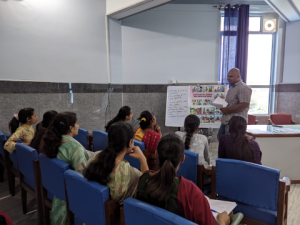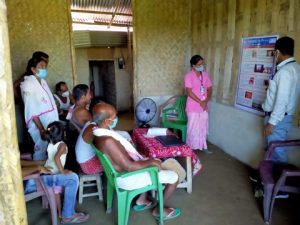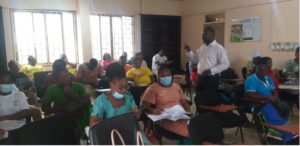Join a powerful, unprecedented alliance for better eye health for all.
Join IAPB-
Choose an alternate language here
Making the UN’s Sustainable Development Goals (SDG) of gender equality a reality begins with building connections with communities.
For Operation Eyesight, starting conversations with the communities where we work has been a key step in improving access to eye health services for women and girls. It has also helped us build gender equality when it comes to accessing local health services more generally.
“Our projects are successful in large part because we get community buy-in right from the beginning. We take a participatory approach to eye health – and that starts by having a conversation with people in a village or community,” says Kashinath Bhoosnurmath, President and CEO of Operation Eyesight.
“These conversations often reveal gender gaps, particularly when it comes to eye health. We know that our approach must take this into consideration.”
Across our South Asian and African countries of work, our teams on the ground commonly identify inequality among the genders as a barrier to accessing health services, including eye health care. These are often entrenched and overcoming them demands an unwavering commitment to eliminating barriers for women and girls. Therefore, we focus on issues surrounding gender from the outset of a project.
By fostering community connections and understanding a community’s unique needs, we are able to deliver care more effectively and also address the systemic barriers to care.
In India, the opening of vision centre staffed entirely by women, as well as the addition of a gender expert to the team is helping us better understand how to improve access to care for women and girls. According to Dr. Troy Cunningham, Operation Eyesight’s Country Director for India, gender barriers and gaps are not always immediately apparent, which is why community engagement is so important.

In India, female-led engagement sessions with our Country Director in India, our local health workers and community participants also helped us identify a number of ‘gender myths.’ We then created a series of information education information (IEC) materials to help overcome these myths, again with the community leading the development process. Eighty women and men from the community attended the in-person engagement sessions facilitated by a local creative writer and a local illustrator. The project resulted in 12 posters, including five focused on gender, cultural myths and featuring topics ranging from maternal and child health to women’s spectacles and preferential access for boys over girls.
Dr. Cunningham says the posters that came out of these sessions are now an engagement tool being used by our community health workers in the field. Our teams use the posters to drive conversations about eye health and gender myths during door-to-door eye health screening and other education activities.
“We wanted to address myths and misconceptions, so the community needed to be part of this exercise and provide the solutions. Participants told us the stories we needed to tell to address gender issues,” says Dr. Cunningham. “It truly was a collaborative process. When communities see themselves in a project, we now know that adoption, success and long-term sustainability are a reality.”

In Ghana, our team of mostly female Community Health Nurses (CHNs) are one of our first points of contact with communities, particularly rural areas. This mostly female team is also employed by the government. With their healthcare training, our team of community nurses use door-to-door eye health screenings as well as child welfare clinics as a chance to engage with women in the community.
Emmanuel Kumah, Operation Eyesight’s Country Director for Ghana, says our nurses working in the community have a chance to dismantle myths and misconceptions surrounding accessing eye care.
“People in the community – particularly women and mothers – walk away from these conversations feeling empowered to take charge of their own eye care and health care,” Emmanuel says. “The best part is that this results in increase uptake of eye services at local district hospitals, so we know these conversations lead to behavioural change.”
He adds that when we enter a community and get them to be part of the solution, our work becomes community-led.
“When we make this a priority everything else changes, including opportunities for women and girls.”

It’s the unique experience and insights of the communities where we work which will enable us to dismantle social and systemic barriers to care. Although the needs and challenges facing each community are unique, engaging with communities is a key step in replicating successes and creating bright futures for girls globally.
Focus on Gender Equity, throughout the year, shares knowledge, inspiration and ideas from some of the world’s most innovative experts and inserts eye health and Gender Equality onto the agenda of the world’s most pressing development issues and is supported by Santen.
Image on top: Women gather to examine the educational materials developed through community workshops as part of the “Empowering Women in Rural India by Debunking Feminine Eye Health Myths” project.